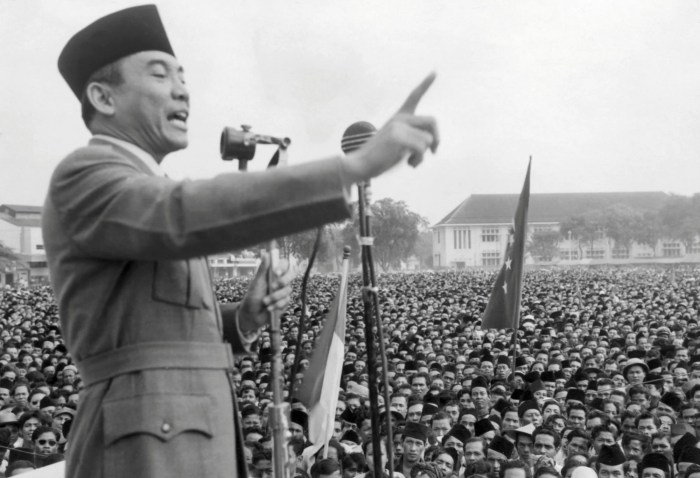Artikel tentang kemerdekaan indonesia dalam bahasa inggris – Kemerdekaan Indonesia adalah momen bersejarah yang mengubah wajah negara ini selamanya. Perjuangan panjang untuk meraih kemerdekaan, yang dipenuhi dengan pengorbanan dan tekad, menjadi inspirasi bagi generasi penerus. Artikel ini akan membahas perjalanan panjang menuju kemerdekaan Indonesia, mengungkap kisah heroik para pahlawan, dan menjelaskan bagaimana kemerdekaan telah mempengaruhi Indonesia hingga saat ini.
Dari pendudukan Jepang hingga proklamasi kemerdekaan, artikel ini akan menelusuri sejarah kemerdekaan Indonesia dengan menceritakan peran tokoh-tokoh penting seperti Soekarno dan Hatta, serta menjelaskan tantangan yang dihadapi Indonesia dalam tahun-tahun pertama kemerdekaannya.
The Role of Nationalism and Patriotism

The Indonesian independence movement was fueled by a strong sense of nationalism and patriotism. These ideals served as the driving force behind the mobilization of the Indonesian people and their resistance against Dutch colonial rule. This section will delve into the crucial role of nationalism and patriotism in the Indonesian independence movement, exploring how these ideals inspired the population and shaped Indonesian society and culture in the post-independence era.
Nationalism and Patriotism: The Seeds of Independence
Nationalism and patriotism played a pivotal role in uniting the Indonesian people and inspiring them to fight for their independence. The Dutch colonial regime had implemented policies that fostered a sense of division and inequality among the Indonesian population. However, the shared experience of oppression and the desire for self-determination gave rise to a powerful sense of national unity.
- The Rise of Nationalist Organizations: The early 20th century witnessed the emergence of several nationalist organizations, such as Sarekat Islam (Islamic Union), Budi Utomo (Moral Upholding), and Perhimpunan Indonesia (Indonesian Association). These organizations advocated for social, economic, and political reforms and promoted the idea of an independent Indonesia.
- The Role of Education: Nationalist leaders emphasized the importance of education in fostering national consciousness. Schools became platforms for disseminating nationalist ideas and promoting the Indonesian language and culture.
- The Power of Propaganda: Nationalist leaders effectively utilized propaganda to spread their message and mobilize the population. They published newspapers, pamphlets, and books that articulated their vision for an independent Indonesia.
Mobilizing the Population: From Passive Resistance to Armed Struggle
Nationalist and patriotic ideals served as the driving force behind the mobilization of the Indonesian population. The initial phase of the independence movement was characterized by passive resistance, such as boycotts of Dutch goods and peaceful protests. However, as the Dutch colonial regime became increasingly oppressive, the movement shifted towards armed struggle.
- The Formation of Guerilla Groups: Nationalist leaders formed guerilla groups that engaged in armed resistance against the Dutch forces. These groups, often operating in remote areas, utilized their knowledge of the terrain and local support to effectively disrupt colonial operations.
- The Role of Women: Women played a significant role in the independence movement. They actively participated in protests, provided logistical support to guerilla groups, and even engaged in combat.
- The Impact of World War II: The outbreak of World War II created an opportunity for the Indonesian independence movement to gain momentum. The Japanese occupation, while oppressive in its own right, weakened Dutch colonial control and provided a space for the growth of nationalist sentiment.
The Enduring Legacy of Nationalism and Patriotism
The Indonesian independence movement was a testament to the power of nationalism and patriotism. These ideals not only inspired the Indonesian people to fight for their freedom but also shaped the nation’s identity and culture in the post-independence era.
- National Unity: The shared experience of struggle against colonial rule fostered a strong sense of national unity among the Indonesian people. This unity was essential for overcoming the challenges of nation-building and consolidating independence.
- Cultural Revival: The independence movement also led to a cultural revival. Nationalist leaders emphasized the importance of preserving and promoting Indonesian culture, which had been suppressed under colonial rule.
- The Pancasila: The five principles of Pancasila, adopted as the nation’s guiding ideology, reflect the values of nationalism, patriotism, and unity.
The Role of International Relations

The struggle for Indonesian independence was not solely a domestic affair. International relations played a crucial role in shaping the outcome of the conflict. The international community’s stance towards the Dutch colonial government and its recognition of Indonesia’s sovereignty significantly impacted the course of events. This section delves into the influence of international relations on the Indonesian independence movement, highlighting the support received from various countries and the impact of international pressure on the Dutch.
Support from International Countries
The Indonesian independence movement garnered support from various countries, including the United States and the Soviet Union. These nations, while pursuing their own geopolitical interests, recognized the importance of decolonization and the right of nations to self-determination.
- The United States, despite its historical ties with the Netherlands, was wary of the potential for communist influence in Southeast Asia. The United States supported the Indonesian cause to prevent the spread of communism and to establish a stable and friendly government in the region. The US provided diplomatic support and humanitarian aid to Indonesia.
- The Soviet Union, on the other hand, saw the Indonesian independence movement as an opportunity to expand its influence in the region. The Soviet Union provided military training and equipment to Indonesian nationalists, contributing to the strengthening of their resistance against the Dutch.
International Pressure on the Dutch
The international community’s support for Indonesian independence exerted considerable pressure on the Dutch colonial government. The United Nations, established in 1945, played a significant role in condemning Dutch actions and advocating for Indonesian independence.
- The UN General Assembly passed resolutions calling for the Netherlands to recognize Indonesian sovereignty. These resolutions, though not legally binding, created international pressure on the Dutch government to negotiate with Indonesian leaders.
- The international condemnation of Dutch actions in Indonesia also contributed to the withdrawal of support from key allies. The United States, for instance, began to distance itself from the Netherlands, expressing concerns over the ongoing conflict and the potential for instability in the region. This loss of international support further weakened the Dutch position.
Challenges and Opportunities for the Future: Artikel Tentang Kemerdekaan Indonesia Dalam Bahasa Inggris
Indonesia, a nation that has proudly stood on its own two feet for over seven decades, faces a new set of challenges and opportunities in the 21st century. The country has come a long way since its independence, but it must continue to evolve and adapt to remain competitive and prosperous in a rapidly changing world.
Economic Development
Indonesia’s economic growth has been impressive in recent years, but it faces challenges in maintaining this momentum. The country needs to diversify its economy, reduce its dependence on natural resources, and create more high-skilled jobs. A significant portion of the population remains below the poverty line, and income inequality persists. To address these issues, Indonesia needs to invest in education, infrastructure, and technology.
Social Inequality
Social inequality is a major challenge in Indonesia. Disparities in access to education, healthcare, and economic opportunities exist between different regions, ethnic groups, and socioeconomic classes. The government needs to implement policies that promote social inclusion and empower marginalized communities.
Political Stability
Political stability is essential for sustainable development. Indonesia has made progress in strengthening its democratic institutions, but challenges remain. Corruption, regional conflicts, and political polarization can undermine stability. It is crucial to ensure that democratic processes are fair and transparent, and that all citizens have a voice in shaping their future.
Opportunities for Progress, Artikel tentang kemerdekaan indonesia dalam bahasa inggris
Despite the challenges, Indonesia has significant opportunities to build on its legacy of independence and achieve further progress in the future. The country possesses a young and growing population, a rich cultural heritage, and abundant natural resources.
The Role of Education, Technology, and Innovation
Education is the foundation for a prosperous and just society. Indonesia needs to invest in quality education at all levels, from early childhood to higher education. This includes providing access to education for all, improving the quality of teaching, and promoting STEM education. Technology plays a crucial role in driving economic growth and addressing social challenges. Indonesia can leverage its digital economy and embrace technological innovation to create new industries, improve productivity, and enhance access to services.
The Importance of Collaboration
Addressing these challenges and harnessing opportunities requires a collaborative effort from the government, private sector, civil society, and individuals. Public-private partnerships, community engagement, and citizen participation are essential for achieving sustainable development.
Looking Ahead
Indonesia has a bright future ahead of it. By addressing its challenges, embracing its opportunities, and working together, Indonesia can build a more prosperous, equitable, and sustainable nation for all.
Penutup

Kemerdekaan Indonesia merupakan tonggak sejarah yang penting, bukan hanya bagi Indonesia, tetapi juga bagi dunia. Kemerdekaan ini membuktikan bahwa semangat juang dan tekad yang kuat dapat mengantarkan sebuah bangsa menuju kebebasan. Melalui artikel ini, kita dapat menarik pelajaran berharga tentang pentingnya persatuan, keberanian, dan semangat nasionalisme dalam meraih cita-cita bangsa.






